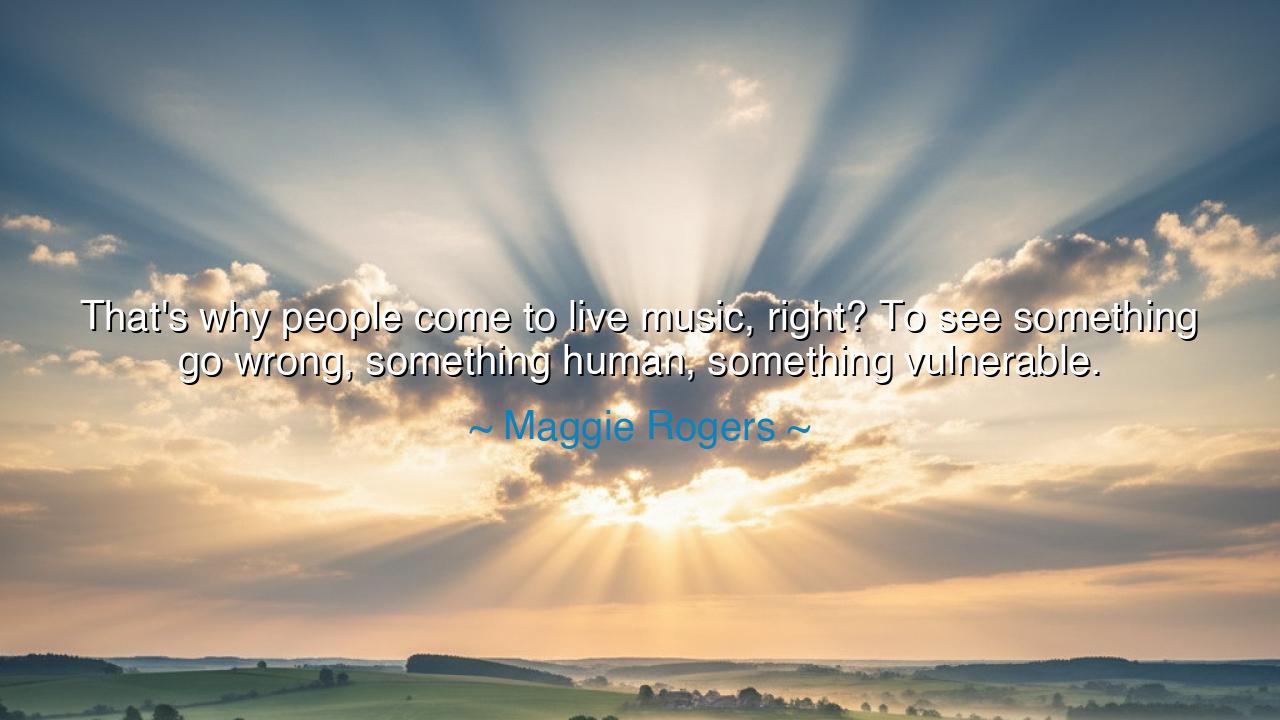
That's why people come to live music, right? To see something go
That's why people come to live music, right? To see something go wrong, something human, something vulnerable.






Maggie Rogers, the poet of song and spirit, once declared with piercing honesty: “That’s why people come to live music, right? To see something go wrong, something human, something vulnerable.” In this reflection lies a truth both tender and profound: that the beauty of live music does not dwell in its perfection, but in its imperfection—in the trembling note, the forgotten lyric, the sudden laugh, the breaking voice. For in those moments, the veil between artist and audience is torn away, and what remains is not performance, but communion.
When she speaks of something human, she speaks against the polished illusions of machines and recordings. Studio albums may be flawless, mastered to the decimal, but the stage is alive. It breathes, it stumbles, it bleeds. The crack in the singer’s voice reveals the weight of emotion; the faltering hand upon the instrument shows the trembling of the heart. These are not failures, but revelations: proof that behind the art stands a living soul. And it is this vulnerability that binds the listener, for we see in the artist a mirror of ourselves—fragile, striving, imperfect, yet radiant.
The ancients knew this hunger well. In the amphitheaters of Greece, crowds did not gather only to watch flawless recitations. They came to witness the trembling of actors, the unpredictability of performance, the raw breath of humanity struggling with the divine. A play without risk was lifeless; a performance without vulnerability was but a hollow mask. So too with music: it is the danger of the live moment, the risk of failure, that makes triumph feel like triumph.
Consider the story of Billie Holiday, whose voice was often frail, cracked, and broken in her later years. Technically, she could no longer sing as she once had. Yet audiences wept, not because the notes were perfect, but because the imperfections carried truth. Her pain, her sorrow, her humanity shone through every broken note, and that truth reached deeper than any flawless performance could. In her vulnerability, she touched eternity.
Rogers reminds us that vulnerability is strength. To dare to stand before others, knowing that mistakes may come, is to reveal the courage of authenticity. Perfection builds walls, but imperfection opens doors. In a world that worships polished surfaces and flawless images, people long for the unguarded, the real, the human. And so, they come to live music not to see a machine execute, but to see a soul exposed.
The lesson, then, is not for musicians alone. It is for all who live and labor in this world: do not fear vulnerability. Do not think that mistakes make you unworthy. Your stumbles may be the very things that connect you most deeply to others. Just as the singer’s cracked note awakens tears, your own flaws, embraced with courage, may awaken compassion, trust, and love. Perfection isolates; vulnerability unites.
Practically, this means: in your work, your art, your speech, allow yourself to be real. Do not wait until you are flawless to share yourself with the world. Speak, create, and act even when you tremble. Let your humanity show, for that is what touches the hearts of others. Just as audiences crave the unscripted moment in music, so do people around you crave the authenticity of your presence.
So let us carry Rogers’ wisdom: people come to live music to see something go wrong, something human, something vulnerable. For it is in brokenness that beauty shines most brightly, in vulnerability that strength reveals itself, and in imperfection that love finds its voice. Be therefore unafraid of your flaws, for they are not your weakness—they are the bridge that binds you to the hearts of others.






AAdministratorAdministrator
Welcome, honored guests. Please leave a comment, we will respond soon